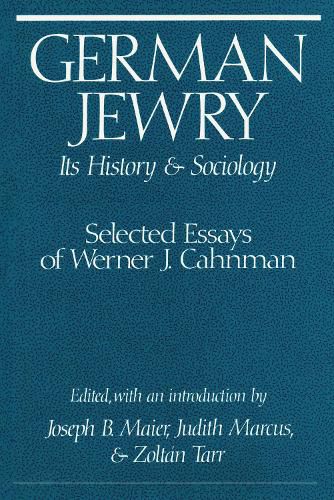Readings Newsletter
Become a Readings Member to make your shopping experience even easier.
Sign in or sign up for free!
You’re not far away from qualifying for FREE standard shipping within Australia
You’ve qualified for FREE standard shipping within Australia
The cart is loading…






This history of post-Emancipation German Jewry and of the Holocaust aftermath has received considerable scholarly attention. The study of Jewish life in Germany in the 1930s and the migration impelled by the Nazi period has, on the other hand, been comparatively neglected. The work of Werner J. Cahnman (1902-1980) goes a long way toward filling this gap.Cahnman’s examination of the Jewish people that dwells among the nations is focused on Germany because it was the country where in modern times the symbiosis … has been most intimate and it also has been the country where the conflict degenerated into the monstrosity of the Holocaust. This representative anthology of his essays shares a common theme, although the examples differ in thought, method and style. Whether he explores the stratification of pre-Emancipation German Jewry, the rise of the Jewish national movement in Austria, or such an esoteric topic as the influence of the kabbalistic tradition on German idealist philosophy; whether he muses on the writing of Jewish history or reports on his firsthand experience in Dachau, Cahnman’s work reflects central concerns of his personal and scholarly existence as a German Jew. Because he usually combined extensive empirical data with his own background and personal experience, he is able to craft a penetrating analysis of the recent history of Jewish life in Central Europe. Werner Cahnman believed that the writing of history is vital for the continued cultural identity of the human kind.
$9.00 standard shipping within Australia
FREE standard shipping within Australia for orders over $100.00
Express & International shipping calculated at checkout
This history of post-Emancipation German Jewry and of the Holocaust aftermath has received considerable scholarly attention. The study of Jewish life in Germany in the 1930s and the migration impelled by the Nazi period has, on the other hand, been comparatively neglected. The work of Werner J. Cahnman (1902-1980) goes a long way toward filling this gap.Cahnman’s examination of the Jewish people that dwells among the nations is focused on Germany because it was the country where in modern times the symbiosis … has been most intimate and it also has been the country where the conflict degenerated into the monstrosity of the Holocaust. This representative anthology of his essays shares a common theme, although the examples differ in thought, method and style. Whether he explores the stratification of pre-Emancipation German Jewry, the rise of the Jewish national movement in Austria, or such an esoteric topic as the influence of the kabbalistic tradition on German idealist philosophy; whether he muses on the writing of Jewish history or reports on his firsthand experience in Dachau, Cahnman’s work reflects central concerns of his personal and scholarly existence as a German Jew. Because he usually combined extensive empirical data with his own background and personal experience, he is able to craft a penetrating analysis of the recent history of Jewish life in Central Europe. Werner Cahnman believed that the writing of history is vital for the continued cultural identity of the human kind.